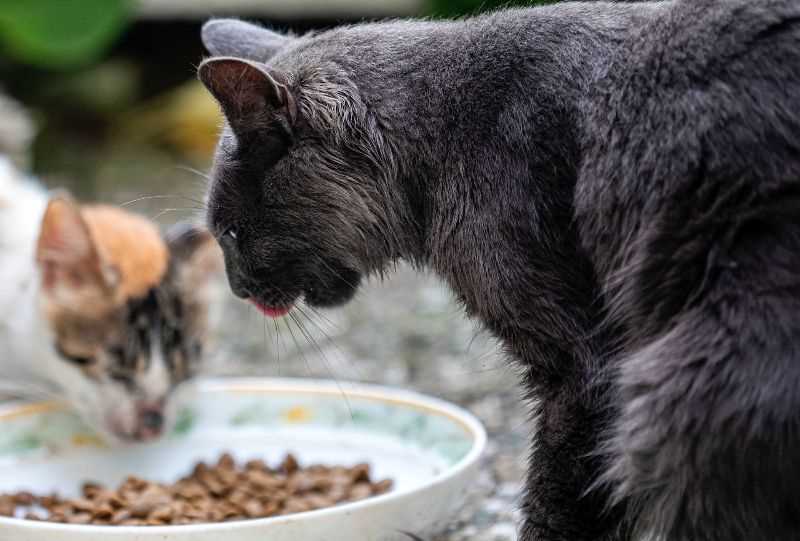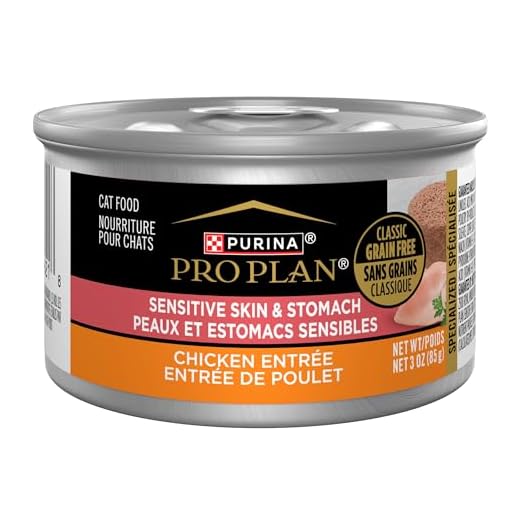




Providing quality nutrition for outdoor felines is critical for their health and well-being. In this article, I will share insights on the optimal types of nourishment suited for these independent animals, focusing on affordability and nutritional value. You will find specific product recommendations that cater to their unique dietary needs.
This piece is particularly valuable for animal lovers, community volunteers, and anyone who cares for wild or abandoned pets. By understanding what to feed them, you can significantly enhance their quality of life and support their survival in harsh conditions.
Throughout the article, I will cover various options available in the market, including wet and dry varieties, with an emphasis on high-protein content and essential nutrients. You will also learn about brands that prioritize sustainability and ethical sourcing, ensuring that the choices made not only benefit the animals but also the environment.
Best Nutrition Choices for Feral Felines
Providing the right nutrition for feral felines is vital for their health and well-being. A balanced diet should include a mixture of protein, carbohydrates, and essential vitamins and minerals to support their immune system and overall vitality.
Opt for options that contain high-quality protein sources, such as poultry or fish, as the primary ingredient. Wet varieties can offer hydration, while dry alternatives may be more convenient for outdoor feeding.
Key Ingredients to Look For
- Meat or Fish: Ensure it is the first ingredient listed to provide necessary protein.
- Healthy Fats: Sources like fish oil support skin and coat health.
- Fiber: Ingredients such as sweet potatoes or peas aid digestion.
- Vitamins and Minerals: Look for added nutrients to enhance overall health.
When choosing meals, consider the specific needs of the outdoor animals. Some may require additional calories due to environmental stresses or health issues. Providing a mix of wet and dry nutrition can help meet their varying needs.
- Monitor their weight and adjust portions accordingly.
- Rotate between different protein sources to prevent food fatigue.
- Consult with a veterinarian if you notice health issues or changes in behavior.
Feeding feral animals responsibly can contribute to their health and the community’s efforts in managing local populations. Proper nutrition fosters a better quality of life and supports their survival in the wild.
Understanding Nutritional Needs of Stray Cats
Providing a balanced diet is fundamental for the well-being of felines living outdoors. These animals require specific nutrients to maintain their health, especially in challenging environments where food sources may be scarce.
High-quality protein is essential for muscle development and energy. Cats are obligate carnivores, meaning their bodies are adapted to derive most of their nutrition from animal sources. Additionally, fats contribute to a shiny coat and overall vitality, while carbohydrates should be minimized as they are not a primary energy source for these animals.
Key Nutritional Components
Understanding the primary nutritional components can assist in selecting appropriate sustenance:
- Proteins: Aim for options with meat as the first ingredient. This supports muscle health and energy levels.
- Fats: Look for sources like fish oil or chicken fat, which provide essential fatty acids.
- Vitamins and Minerals: Ensure the meal contains necessary vitamins such as A, D, E, and minerals like taurine and calcium for overall health.
When feeding these animals, consider their hydration needs. Access to fresh water is just as important as nutrition. Dehydration can lead to serious health issues, particularly in hot weather.
In addition to macronutrients, monitor portion sizes to prevent obesity, which can lead to further health complications. Regularly assess the condition of the animals and adjust their diet accordingly.
Commercial Brands for Outdoor Felines
When selecting nourishment for outdoor companions, it’s important to focus on high-quality options that provide necessary nutrition while being easily accessible. Many brands excel in offering products specifically formulated to meet the unique needs of these animals.
Quality ingredients are key. Look for options that prioritize real proteins, healthy fats, and essential vitamins and minerals. These components help support the overall health and energy levels of outdoor dwellers.
Considerations for Nutritional Value
- Protein Sources: Real meat or fish should be the primary ingredient, ensuring adequate protein intake for muscle maintenance.
- Fat Content: Healthy fats from sources like fish oil can aid in coat health and provide energy.
- Vitamins and Minerals: Essential nutrients support immune function and overall well-being, especially in outdoor environments.
Many commercial options also include added probiotics for digestive health and antioxidants to combat environmental stressors. Selecting a brand with a good reputation for quality control can further ensure the safety and effectiveness of the products.
Price can vary significantly, but investing in higher-quality options often leads to better health outcomes for outdoor companions. Regularly monitoring their condition and adjusting the diet as necessary can also enhance their well-being.
Homemade Recipes for Feline Rescue
Creating nutritious meals for rescued felines can be both rewarding and beneficial for their health. One simple option is to prepare a mixture of cooked chicken and vegetables. Start by boiling chicken breasts until fully cooked, then shred the meat. Combine it with steamed carrots and peas, ensuring that the vegetables are soft enough for easy consumption.
Another approach involves a hearty blend of ground turkey and rice. Cook ground turkey in a skillet until browned, adding cooked rice and a small amount of pumpkin puree for added fiber. This recipe provides protein and carbohydrates, essential for maintaining energy levels.
Sample Recipe Ideas
- Chicken and Veggie Mix:
- 1 cup shredded chicken
- 1/2 cup steamed carrots
- 1/2 cup steamed peas
- Turkey and Rice Delight:
- 1 cup cooked ground turkey
- 1 cup cooked rice
- 1/4 cup pumpkin puree
Ensure all ingredients are free from seasoning and harmful additives. Serving these meals at room temperature will encourage consumption. Always introduce new dishes gradually to avoid digestive issues, and observe for any allergic reactions. Providing hydration alongside these meals is crucial, so fresh water should always be accessible.
Factors to Consider When Choosing Cat Food for Strays
When selecting nourishment for felines living outdoors, prioritize nutritional value. Look for options that provide a balance of proteins, fats, and carbohydrates to support their health and energy needs. High-quality protein sources are vital, as they contribute to muscle maintenance and overall well-being.
Another significant aspect is the ingredient list. Choose products with real meat or fish listed as the primary component, avoiding those with excessive fillers or artificial additives. This ensures that the animals receive the necessary nutrients without harmful substances.
Additional Aspects to Keep in Mind
- Price: Budget constraints are often a reality. Seek affordable options that do not compromise on quality.
- Palatability: Strays may be more selective about taste. Consider products that are known for their appeal to help ensure they consume adequate amounts.
- Availability: Choose brands that are widely available or easily accessible to ensure consistent feeding.
- Life Stage: Select formulas designed for adult animals, as nutritional requirements vary by age.
In addition, consider the packaging. Products that come in resealable bags or cans can help maintain freshness and prevent waste. Lastly, observe the animals’ health and behavior after feeding to adjust choices based on their reactions and needs.
Feeding Strategies to Attract and Care for Feral Felines
Provide high-quality nourishment, rich in protein and nutrients. Look for options that contain real meat as the primary ingredient, avoiding fillers and artificial additives. Consider wet varieties, as they offer hydration and are often more appealing to these animals.
Establish a consistent feeding schedule. Set specific times for meals, which helps the community of free-roaming pets learn when and where to find sustenance. This routine can also assist in monitoring their health and well-being.
Key Strategies
- Location: Choose quiet, sheltered spots away from heavy foot traffic. This reduces stress and encourages regular visits.
- Feeding Stations: Use a designated feeding area to minimize competition and conflict among multiple animals. This can be as simple as a sturdy bowl or a more elaborate setup with a roof for protection from weather.
- Water Access: Always provide fresh water. A shallow bowl or a pet water fountain can attract them, especially in warmer months.
- Monitoring Health: Observe the animals regularly for signs of illness or injury. If possible, seek veterinary care for those in need.
- Trap-Neuter-Return (TNR): Consider participating in TNR programs. This helps control the population and improves the overall health of the community.
By implementing these strategies, you create a safe environment that encourages feral felines to thrive. Consistent care not only benefits their health but fosters a sense of community and compassion towards these animals.
Best cat food for stray cats
Features
| Part Number | 00038100186225 |
| Model | 038100186218 |
| Color | Other |
| Release Date | 2022-01-21T00:00:01Z |
| Size | 3 Ounce (Pack of 24) |
Features
| Part Number | 21012 |
| Model | 21012 |
| Warranty | Solid Gold does not warranty product sold through unauthorized resellers as it could be tampered with, expired, stored improperly, transferred improperly, or counterfeit. |
| Color | Chicken & Egg |
| Size | 12 Pound |
Features
| Part Number | 800286 |
| Model | 70 |
| Warranty | If you have a question that needs immediate attention, please call (800) 919-2833. |
| Color | Brown |
| Size | 11 Pound (Pack of 1) |
Features
| Part Number | 70 |
| Model | 70 |
| Warranty | If you have a question that needs immediate attention, please call (800) 919-2833. |
| Color | Brown |
| Size | 12 Pound (Pack of 1) |
Features
| Part Number | 4346892068 |
| Size | 44 Pound (Pack of 2) |
Video:
FAQ:
What is the best type of food for stray cats?
The best type of food for stray cats typically includes high-quality dry kibble or wet food that is rich in protein and essential nutrients. Look for options that contain real meat as the first ingredient and avoid those with excessive fillers like corn or soy. Wet food can provide additional hydration, which is beneficial for stray cats that may not always have access to fresh water. It’s also wise to consider foods that are specifically formulated for cats, as they contain the necessary vitamins and minerals for their health.
How can I help stray cats with their feeding?
Helping stray cats can be done in several ways. First, you can provide food regularly in a safe and quiet location where they feel secure. Make sure to choose a high-quality cat food that meets their nutritional needs. It’s also a good idea to monitor the feeding area for cleanliness and to ensure that other animals are not being attracted to the food. If you’re able, consider getting involved with local animal organizations that focus on trap-neuter-return (TNR) programs, as this helps control the stray cat population while improving their overall health. Additionally, keeping an eye out for any signs of illness in the cats can prompt you to seek veterinary care if necessary.









